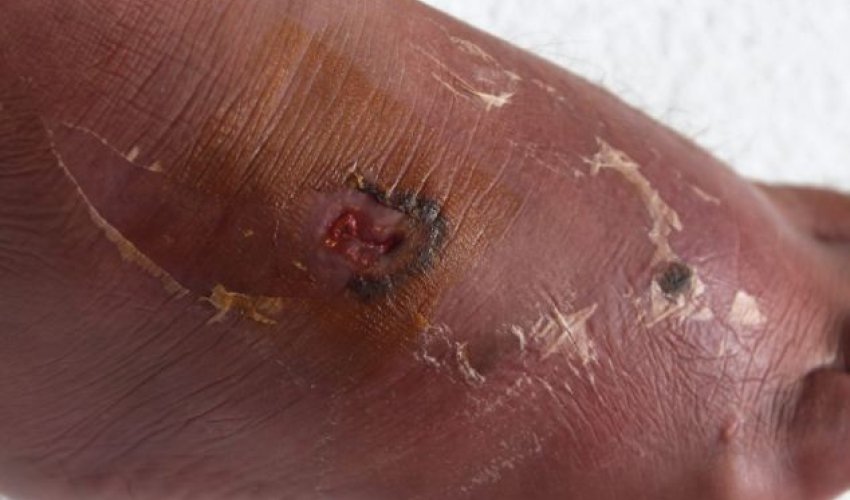Father dies after STINGRAY attack PHOTO

A father 'nearly died' after being attacked by a stingray while on holiday in Florida.Micheal Yarwood, 42, contracted flesh-eating bacteria after the animal stabbed him with its poisonous barb while swimming in he sea with his two children.Micheal and his daughter Holly, 14, and son Callum, 17, were watching dolphins swimming at the time of the accident.The family were wading in water up to their waist near St Petersburg when Michael felt a sharp stabbing pain in his right foot.A stingray and lanced him, causing a 4in deep wound.He made it back to shore where his wife Natalie, 41, poured water over the heavily bleeding wound before wrapping it in a towel.The electrical engineer, from Middleton, Greater Manchester, drove back to his hotel but by the next morning his foot was double its normal size.Medics initially gave him a tetanus shot and antibiotics, but after he came down with a fever and started uncontrollably shaking he went to hospital.There doctors told him he had contracted a potentially deadly flesh-eating bacteria, which thrives in saltwater has already killed 10 people in Florida this year, and warned him he could lose his foot.However, after five days in hospital on an IV drip, Micheal recovered and was able to travel home, though he still need a stick to walk.He said: 'It's a lot better now. I'm pottering about, even though it's still painful. It's nowhere near as bad as it was.'If it had been one of my children - who were two feet away from me - it could have been a different story.'The £5,000 holiday had been a treat for son Callum ahead of his 18th birthday, and they had driven out from their Bahama Bay resort to North Beach as it is regarded as the most beautiful in the US.Mr Yarwood is now warning holidaymakers going to Florida to be wary of the sea and says he is thankful the insurance he took out covered his $20,000 medical bill.In 2006 TV's famous 'crocodile hunter' Steve Irwin was killed by a stingray while diving off Australia.The Vibrio vulnificus bacteria is transmitted via open wounds and lives in warm, salty water. When it comes in contact with damaged skin, it can cause lesions. High-risk individuals, such as those with liver disease or cancer, have a 50% fatality rate. About half of all infections require dead tissue to be removed, or a body part to be amputated.Illness usually begins within one to three days of exposure, but can take up to a week. Symptoms include fever, swelling and redness of skin on arms or legs, with blood-tinged blisters, low blood pressure and shock.Florida averages 50 cases, 45 hospitalizations and 16 deaths annually, the most in the Gulf Coast region, according to the state Department of Health. Across the US about 95 cases, 85 hospitalizations and 35 deaths happen every year.(dailymail.co.uk)ANN.Az
Similar news
Similar news
Latest news 
More news 



































 Photo
Photo 



 Video
Video 

